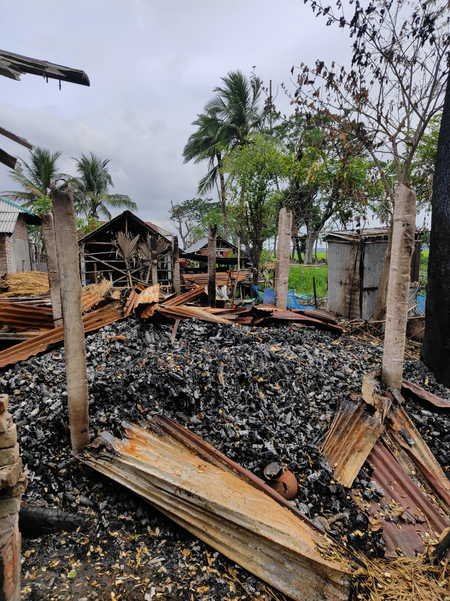The Human Rights Congress for Bangladesh Minorities (HRCBM) today drew attention to a recent brutal communal attack in Bangladesh where over 18 homes belonging to Hindu families were looted, vandalized, and set on fire in the southwestern Abhaynagar Upazila. The rights body has submitted fresh evidence to the International Criminal Court (ICC), alleging complicity at the highest levels of the interim government led by Muhammad Yunus.
The HRCBM released a series of images depicting the widespread devastation, showing burned-out shells, collapsed structures, blackened walls, and scorched possessions of the minority Hindu community. According to the HRCBM, the destruction was inflicted by a mob from the local Muslim-majority population, forcing entire families to flee and leaving behind deserted village streets and smoldering ruins.
The violence reportedly erupted late on May 24, 2025, following the murder of Torikul Islam, President of the opposition Krishak Dal in Jessore, who was hacked and shot dead over a land dispute involving a fish enclosure. While authorities initially linked the murder to personal and property tensions, the killing swiftly ignited communal violence.
The HRCBM stated that a mob drawn from the local Muslim-majority population targeted Hindu households in Dhor Moshihati village, looting valuables, burning granaries, stealing 31 cattle, and setting fire to 18 homes. Disturbingly, a young Hindu nursing student named Sagar was abducted during the violence and remains missing. The attack forced almost all Hindu families to flee, with only the elderly and infirm remaining.
Allegations Against Interim Government
The human rights organization expressed grave concern over a public statement made by interim government leader Muhammad Yunus in a social media post, which was later deleted. In the post, Yunus allegedly blamed “some Hindu villagers” for the murder and characterized the violence as “retaliatory” over a business dispute, dismissing reports of targeted minority violence as “propaganda.”
The HRCBM, in its supplementary submission to the ICC, argued that “the statement rationalized communal violence against an identifiable group and the attack reflected a wider pattern of systemic persecution and impunity.”
Documentation and Demands for Justice
Following the attack, the HRCBM visited Dhor Moshihati village to document the destruction, gather testimonies, and assess the immediate needs of displaced families. Their findings, including photographic evidence of charred homes, looted properties, and empty granaries, form the basis of their ICC submission. Survivors recounted their terror as the mob descended on their homes late at night, forcing them to flee with only the clothes on their backs.
The HRCBM further highlighted that no police case (FIR) has been filed against the attackers so far, and the fire service’s delayed response exacerbated the destruction. They also pointed out that no Bangladeshi NGOs receiving foreign funding or the UN office in Dhaka have offered any legal or humanitarian assistance to the affected families.
The HRCBM emphasized that the Abhaynagar attack “fits into a troubling pattern of communal violence in Bangladesh, where minorities — including Hindus, Buddhists, Christians, Ahmadiyyas, and Indigenous peoples — face periodic mass attacks, often with little accountability.” According to data shared by the Indian Minister of External Affairs (MoS), Kirti Vardhan Singh, in April 2025, over 2,400 minority-related incidents were reported in Bangladesh between August 5, 2024, and March 23, 2025. Another report indicates 142 cases of violent attacks against Hindus, including rape and property destruction, between January and March 2025 alone.
In its ICC submission, the human rights body called for an urgent preliminary examination into the Abhaynagar incident and broader crimes against humanity targeting minorities. Specifically, the HRCBM demanded:
- Immediate arrest and prosecution of those responsible for arson, looting, and abduction.
- Justice in Torikul Islam’s murder without scapegoating minorities.
- Rehabilitation and protection for displaced families.
- An inquiry into official negligence, including the fire service’s failures.
- International oversight to safeguard minority rights.

